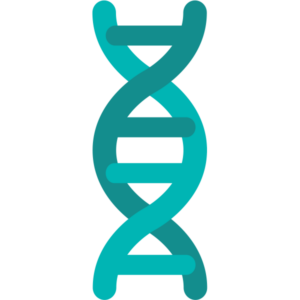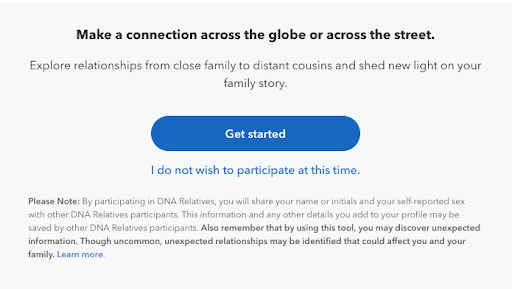By Brianne Kirkpatrick, MS, LCGC
Healthcare providers are used to the unexpected from patients showing up in the clinic: A scan ordered for liver symptoms might reveal a spot in the lungs. Irregular findings on a blood test during an annual physical exam might lead to follow-up tests for leukemia.
But what happens when a DNA test gives your patient a surprising result about family relationships?
More surprises are being revealed with more people engaging in direct-to-consumer tests like 23andMe that share information about genetic relationships between customers.
If you work with a patient who comes into the clinic with a surprise DNA family discovery, below are a few questions you should ask yourself to help your patient navigate this unexpected discovery.
How is this affecting my patient?

Surprise findings of family relationships uncovered by a DNA test can have an emotional impact, and the discovery could impact your patient’s health.
Probably the most dramatic impact would be if a patient discovered through DNA testing that their parents are not their biological parents. To handle such a discovery, a healthcare provider can offer understanding and grief support.
Beyond that potentially traumatic experience are other surprises that could impact a person’s sense of identity. For instance, a patient could learn that the ethnicity they have always identified with is different. Not everyone is quick to adjust to unexpected changes in the way they self-identify in the world.
However, perhaps most relevant for a healthcare provider is that discovering new genetic connections would change a patient’s reported family health history, a cornerstone for many medical records. A patient may be forced to disregard their family medical history and be unable to replace it immediately with an accurate report. For some people, it is a long road to identify a newfound biological parent, make contact with them, request family medical information, and receive answers. For some, that information might never come.
A healthcare provider should consider the different aspects and impacts of a family discovery, let your patient know they are not alone in their experience, and begin looking into the options. Referring them to the Navigating Unexpected Relationships page on the 23andMe customer website, if they have not already found their way to it, can be a great start.

Diana’s story, a case study of an unexpected DNA Discovery:
As a proactive person about her health, Diana spoke with her physician about direct-to-consumer DNA testing. He said using 23andMe was a nice way for her to explore genetics. Both were shocked when a match in her DNA Relatives results listed matches that revealed she had a different biological father.
This discovery is known as an NPE (a “not parent expected” discovery) in genealogy. While this kind of thing is well known enough to warrant an acronym, neither Diana nor her doctor were sure what to do once the discovery was made.
Into whose domain does this concern fall?
This discovery had a huge impact on Diana. She described how it changed not just her sense of identity but also certain relationships in her life. But are those impacts relevant to her doctor?
The short answer is yes. The medical field has branched into specialties to address the specific needs of patients, whether their issues involve the workings of the heart or of the mind. If a patient is distressed by a family discovery, they may need support from someone in the mental health space.
If a patient comes to them after making a significant discovery from one of these tests, a doctor may have to be able to answer questions about the accuracy or meaning of a test finding. A healthcare professional may need to refer their patient to someone in genetics and family relationships for follow-up testing.
Medical Questions
If the questions raised by the test are medical in nature, think of three professionals: medical geneticists, genetic nurses, and certified genetic counselors. These specialists work in many different areas—cancer, prenatal and preconception, neurology, metabolism—and are your partners in helping patients navigate the unexpected findings from DNA tests.
For Diana, her surprising discovery even led her to change plans. She had to visit the place she had believed to be her ancestral homeland. She discovered online resources like the Watershed DNA online forum where members discuss online and over weekly video calls the aspects of surprise DNA discoveries that impact them. Here’s what Diana had to say about what she wishes her doctor had done during the testing process:
“I wish my doctor had executed the same proactive approach to my NPE discovery and mental health as he did for my physical health. It isn’t enough to warn your patient that they might discover some unsettling news but to be prepared on how to lead your patient if that trauma occurs. A simple handout with a list of resources would have been enough to get me started. Not only would it have pointed me in the direction of healing, but it would also have been tangible evidence that I wasn’t alone in this experience.”
Preparation for the Unexpected is Key
Most people who undergo DNA testing and opt-in to view DNA relatives do not receive a surprise like Diana’s. Most customers learn more about health information, make expected connections to family, or confirm what they know about their genetic ancestors.
Most healthcare providers will find a different set of questions a patient hopes to answer when talking with them about their 23andMe results. Being prepared for any situation that arises from a DNA test is key to being ready when a patient reaches out to discuss 23andMe.

Brianne Kirkpatrick is a genetic counselor and DNA consultant. She previously wrote about DNA testing and adult adoptees for the blog. She founded Watershed DNA and the author of the book DNA Guide for Adoptees. An alumnus of Indiana University and Northwestern University, Brianne is a member of the National Society of Genetic Counselors, American Board of Genetic Counseling, American Counseling Association, and International Society of Genetic Genealogy. She lives in Crozet, Virginia, with her husband and their three children.